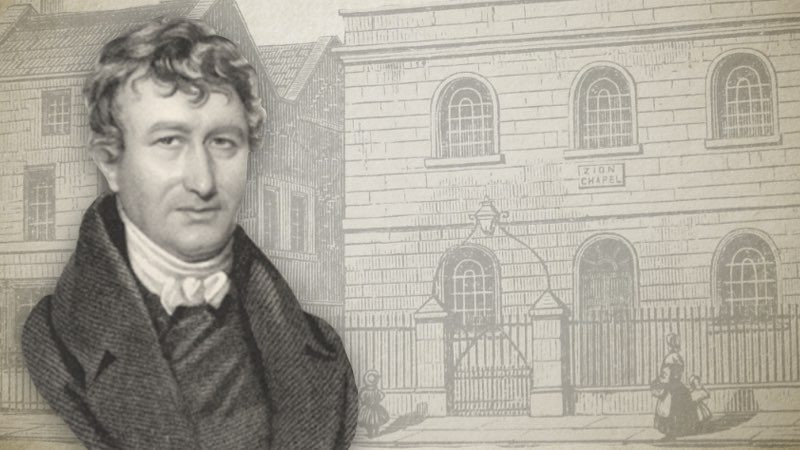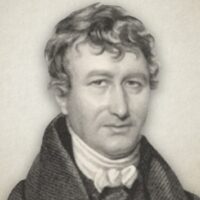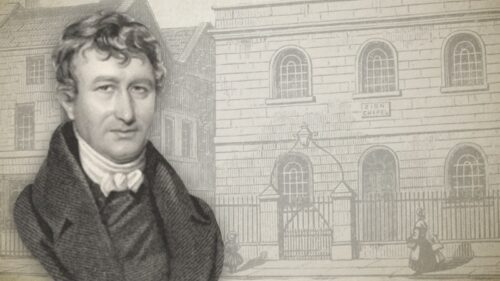
The Life And Testimony Of John Warburton
Hold Fast, John Hazelton:
John Warburton (1776-1857) was a link between two generations, for in the early years of his ministry he was encouraged by William Huntington and afterwards became the friend of Joseph Charles Philpot, whom he baptized at Allington in 1835. Of him Mr. Philpot says: “I have heard Mr. Gadsby preach as great, perhaps greater sermons, but I never met with a minister whose prayer in the pulpit, or whose conversation out of it, was so weighty. Hundreds, perhaps thousands, have borne witness to the power and savour which rested upon his testimony; but the blessing he has been made to the Church of God will never be fully known until the day when the secrets of all hearts shall be revealed.” Rochdale and Trowbridge were the places of his pastorates, and by his book, “Mercies of a Covenant God,” his memory will long be cherished by the family of faith. His account of his interview with Huntington casts light upon the character of these two men of God and gives us a glimpse of the latter in his study in his house at Hermes Hill, Pentonville: “The good old man was sitting at his table with his cap on, and his Bible open before him, and he looked just like the Prophet Elijah in my eyes. But I was so shaken that I could hardly tell what to stammer out, nor did I know for a few moments what to say. At last, however, I said I had read his book, ‘The Kingdom of Heaven taken by Prayer,’ many years ago, and it had been made a great blessing to my soul then, as it had been ever since at times, and that I had made a vow that if ever I came anywhere near where he was I would tell him of it. But the dear old man never spoke a word, nor lifted up his head. At last I said, ‘It is a mercy that we are poor sinners!’ He replied, ‘There are many poor sinners that know nothing of the matter.’ Warburton then began to speak of the work of God the Holy Ghost in the heart. Huntington looked up and said, ‘What dost thou know of the love of God? What is it? And what are the effects of it when known and felt in the soul?’ Then I told him what God had done for me. He looked up with tears running down his cheeks and blessed God for what He had taught me; and I believe he brought twenty portions of God’s Word to prove that it was the teaching of the blessed Spirit of God; and we both wept together. He opened his table-drawer and scraped up all the silver he had in it and poured it into my hands, and said ‘I give you this for your family.’ With great cordiality he shook me by the hand and uttered words which have been a source of many comfortable moments to me since, when I have been sinking almost into despair. The words were these: ‘May the Lord God of Abraham, of Isaac, and of Jacob, bless thee and go with thee.'”
John Warburton’s last moments bore testimony to the blessing invoked. The dying saint wished to say something; he was asked, “Is it to tell how good the Lord is to you in your last moments?” He lifted up both hands, and waving them with peculiar delight, said “Yes, yes.” He still continued to appear as if those around him did not sufficiently understand him. With great exertion he lifted up both hands, pointing with his finger and labouring to articulate something. At last he said, “Hal—Hal—!” Then followed with a firm voice, without a waver, “Hallelujah!” and he immediately breathed out his soul. “Mark the perfect man, and behold the upright; for the end of that man is peace.”
His son, who became pastor of the church at Southill, Beds, was in his early days very wayward, and enlisted in the army. Dear old Mr. Warburton followed him from place to place with prayers and tears, and at last wrote to Arthur Triggs (1787-1859), who was then at Plymouth—afterwards at Zion Chapel, Waterloo Road, and Gower Street Chapel—asking him to see his boy. He willingly undertook this task, and with the utmost kindness and consideration wrought for the welfare of the lad. His father wrote: “O the kindness, the love, and feeling, that my dear brother Triggs manifested to one so unworthy! It knit my soul to him in a moment, and we were one spirit. Scores of times has my soul begged the best of blessings to rest upon him and his. The poor prodigal returned home, and a hearty welcome he had, and I soon found the work was of God.” Here were two good men often libelled as “hard” and “narrow,” deeply stirred by concern for this poor wanderer, and in this, as throughout their lives, tender and patient in their dealings with such as he. Every doctrine of grace applied to the heart by the Holy Spirit melts and softens, sanctifies and solemnises, banishes levity, and gives depth, weight, and power to testimony. Father and son never wavered from the truth, were never carried about with divers and strange doctrines, and never speculated or reasoned beyond what they knew and felt for themselves.
John Warburton (1776-1857) was a Strict and Particular Baptist preacher. He was appointed the pastor of Zion, Trowbridge, where he labored in the gospel among the Lord’s people for forty-two years. John Hazelton wrote of him:
“John Warburton (1776-1857) was a link between two generations, for in the early years of his ministry he was encouraged by William Huntington and afterwards became the friend of Joseph Charles Philpot, whom he baptized at Allington in 1835. Of him Mr. Philpot says: "I have heard Mr. Gadsby preach as great, perhaps greater sermons, but I never met with a minister whose prayer in the pulpit, or whose conversation out of it, was so weighty. Hundreds, perhaps thousands, have borne witness to the power and savour which rested upon his testimony; but the blessing he has been made to the Church of God will never be fully known until the day when the secrets of all hearts shall be revealed." Rochdale and Trowbridge were the places of his pastorates, and by his book, "Mercies of a Covenant God," his memory will long be cherished by the family of faith. His account of his interview with Huntington casts light upon the character of these two men of God and gives us a glimpse of the latter in his study in his house at Hermes Hill, Pentonville: "The good old man was sitting at his table with his cap on, and his Bible open before him, and he looked just like the Prophet Elijah in my eyes. But I was so shaken that I could hardly tell what to stammer out, nor did I know for a few moments what to say. At last, however, I said I had read his book, 'The Kingdom of Heaven taken by Prayer,' many years ago, and it had been made a great blessing to my soul then, as it had been ever since at times, and that I had made a vow that if ever I came anywhere near where he was I would tell him of it. But the dear old man never spoke a word, nor lifted up his head. At last I said, 'It is a mercy that we are poor sinners!' He replied, 'There are many poor sinners that know nothing of the matter.' Warburton then began to speak of the work of God the Holy Ghost in the heart. Huntington looked up and said, 'What dost thou know of the love of God? What is it? And what are the effects of it when known and felt in the soul?' Then I told him what God had done for me. He looked up with tears running down his cheeks and blessed God for what He had taught me; and I believe he brought twenty portions of God's Word to prove that it was the teaching of the blessed Spirit of God; and we both wept together. He opened his table-drawer and scraped up all the silver he had in it and poured it into my hands, and said 'I give you this for your family.' With great cordiality he shook me by the hand and uttered words which have been a source of many comfortable moments to me since, when I have been sinking almost into despair. The words were these: 'May the Lord God of Abraham, of Isaac, and of Jacob, bless thee and go with thee.'"
John Warburton's last moments bore testimony to the blessing invoked. The dying saint wished to say something; he was asked, "Is it to tell how good the Lord is to you in your last moments?" He lifted up both hands, and waving them with peculiar delight, said "Yes, yes." He still continued to appear as if those around him did not sufficiently understand him. With great exertion he lifted up both hands, pointing with his finger and labouring to articulate something. At last he said, "Hal—Hal—!" Then followed with a firm voice, without a waver, "Hallelujah!" and he immediately breathed out his soul. "Mark the perfect man, and behold the upright; for the end of that man is peace."
His son, who became pastor of the church at Southill, Beds, was in his early days very wayward, and enlisted in the army. Dear old Mr. Warburton followed him from place to place with prayers and tears, and at last wrote to Arthur Triggs (1787-1859), who was then at Plymouth—afterwards at Zion Chapel, Waterloo Road, and Gower Street Chapel—asking him to see his boy. He willingly undertook this task, and with the utmost kindness and consideration wrought for the welfare of the lad. His father wrote: "O the kindness, the love, and feeling, that my dear brother Triggs manifested to one so unworthy! It knit my soul to him in a moment, and we were one spirit. Scores of times has my soul begged the best of blessings to rest upon him and his. The poor prodigal returned home, and a hearty welcome he had, and I soon found the work was of God." Here were two good men often libelled as "hard" and "narrow," deeply stirred by concern for this poor wanderer, and in this, as throughout their lives, tender and patient in their dealings with such as he. Every doctrine of grace applied to the heart by the Holy Spirit melts and softens, sanctifies and solemnises, banishes levity, and gives depth, weight, and power to testimony. Father and son never wavered from the truth, were never carried about with divers and strange doctrines, and never speculated or reasoned beyond what they knew and felt for themselves.”




